人教新版英语六年级上册第二单元中文翻译演示教学
六年级上册英语u2课文翻译

六年级上册英语u2课文翻译六年级上册英语unit2课文:A部分Let’s talk课文以及翻译:Mike: Good morning, Mrs Smith!迈克:早上好,史密斯老师!Mrs Smith: Hi, children. You’re early. How do you come to school?史密斯老师:你们好,孩子们。
你们真早。
你们怎么来学校的?Amy: Usually, I come on foot. Sometimes I come by bus.埃米:通常,我走路来。
有时我乘公共汽车来。
Mike: I often come by bike.迈克:我经常骑自行车来。
Amy: How do you come to school, Mrs Smith? By car?埃米:你怎么来学校的,史密斯老师?乘小汽车吗?Mrs Smith: Sometimes, but I usually walk.史密斯老师:有时,但是我通常走路来。
Mike: That’s good exercise.迈克:那是很好的锻炼。
B部分Let’s talk课文以及翻译:Wu Binbin: Mr Jones, how can I get to the Fuxing Hospital?吴彬彬:琼斯先生,我怎么到复兴医院?Mr Jones: Take the No. 57 bus over there.琼斯先生:在那边乘57路公共汽车。
Wu Binbin: Thanks. Wow! So many pictures of bikes!吴彬彬:谢谢。
哇!这么多张自行车的照片!Mr Jones: They’re from my cousin in the USA.琼斯先生:它们来自我在美国的表哥。
Wu Binbin: What’s this?吴彬彬:这是什么?Mr Jones: A helmet. In the USA people on bikes must wear one.琼斯先生:一个头盔。
人教版六年级英语上册Unit2 完整版课件PPT

ship
subway
taxi
bus
by
plane bike
15
train
.
.
I go to school by bus.
16
.
I go to school on foot.
17
. 18
.
nature park 自然公园
19
.
get there get to there
How can we get there?
5. DonoDn'otnr'ut nthoenrutnhefefrerryr(y..)
.
68
homework
1. 完成练习册PartB; 2. 抄写短语2遍Let's learn; 3. 读书并家长签名; 4. 熟记本课单词,下周听写。
.
69
70
.
对应词:same
fast→slow
单数:child
go的过去式
don't的过去式
61
.
How many+可数名词复数 多少(问数量)
everyone 后面的动词要用单数形式( 每个人)
62
.
for 为/给
at home 在家
63
.
必须
must+动词原形
同音词:buy/bye
救生衣
同音词:to/two
at a yellow light.
at a green light.
at a red light.
.
58
1. If the light is red, you must___________.
go 2. 2. If the light is green, you must___________. stop 3. 3. If the light is yellow, you must___________.
人教(精通版)六年级上册Unit2课件资料讲解

18.tea /ti:/ 茶
19.play computer games 玩电脑游戏
/kəm`pju:tə/
20.make dolls 做布娃娃
21.take photos 照相
/dɔls/
22.photo /`fəutəu/ 照片
23.kid /kid/ 小孩
24.baby /beibi/ 婴儿
25.hungry /`hʌŋgri/ 饿的
collect toy cars 收集玩具汽车
collect stamps 收集邮票
collect maps 收集地图
collect picture cards 收集图片
What’s your hobby ? My hobby is collecting men hobby collect map box colour
What’s your hobby ? My hobby is collectign maps.
Let’s talk.
Let’s chant.
oo /u:/
There’s a swimming pool.
In my primary school.
3.What’s your grandpa’s hobby ?
你爷爷的爱好是什么?
His hobby is planting flowers 他的爱好是种花。
Jim: Hi,Gao Wei! Do you want to look at my family photos?
GaoWei: Sure! Wow! What’s he doing ? Jim: My grandpa is fishing.
26.cry /krai/ 哭
1.collect /kə`ləkt/ 收集
人教版六年级上册英语第二单元Let's talk逐字稿

人教版六年级上册英语第二单元Let's talk逐字稿accent、interesting、queue、genius、compare、omit等。
一、accent英['æksent] 美['æksent]n. 重音;口音;强调vt. 重读;强调She spoke with an Irish accent.她说话带有爱尔兰口音。
二、interesting英[ˈɪntrəstɪŋ] 美['ɪntrəstɪŋ]adj. 有趣的;引起兴趣的,令人关注的短语anything interesting 什么有趣的东西; 有趣的事; 什么有趣的; 任何有趣interesting episode 趣事Most Interesting 精华区Interesting Times 趣味横生的时光; 有趣的时光interesting a引人入胜的; 有趣的; 引人人胜的三、genius英-['dʒiːnɪəs]美-['dʒinjəs]释义n. 天才,天赋;精神first英-[fɜːst]美-[fɝst]释义num. 第一第一;开始;冠军adj. 第一的;基本的;最早的adv. 第一;首先;优先;宁愿genius first放在一起可以理解为“天才优先”四、east英[iːst] 美[iːst]adj. 东方的adv. 向东方n. 东方;东部1、east的基本意思是“东,东方”,指与西方相对的一个特定的方向,即日出的方向。
2、east可与介词at,in,on,to等搭配,表示“位于…的东方”。
3、east用作主语时一般用作专有名词,首字母常大写。
4、east用作形容词时的意思是“东方的,向东方的”,指某人或某事处于在东部或趋向于东方的状态。
5、east在句中只能用作定语,无比较级和最高级形式。
五、omit英[ə'mɪt] 美[ə'mɪt]vt. 省略;遗漏;忘记;删去I could omit the overseas section at this point.。
人教版PEP六年级英语Unit 2 Last Weekend第二单元全文翻译
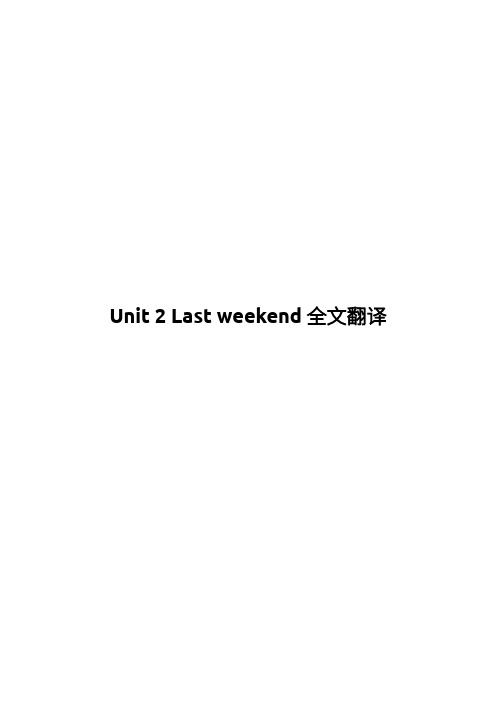
Unit 2 Last weekend 全文翻译Unit2《Last Weekend》Main生词本1. weekend 周末2. clean 打扫3. play football 踢足球4. wash 洗课文翻译Last weekend上周末What did you do last weekend?你上周末干什么了?I cleaned my room and washed my clothes on Saturday.我星期六打扫了房间,还洗了衣服。
Did you play football with Zhang Peng?你跟张鹏踢足球了吗?Yes, I did.是的,我踢了。
We played football on Sunday.我们星期日踢足球了。
Unit2 A Let's try & Let's talk生词本1.cleaned (clean的过去式)打扫2.stayed (stay的过去式)停留;待3.washed (wash的过去式)洗4.watched (watch的过去式)看课文翻译A Let's trySarah and Mike are talking about this weekend. Listen and circle.萨拉和麦克正在谈论这个周末。
听录音,圈出正确的答案。
Tomorrow is Monday.明天是星期一。
We will have class again soon.我们很快又要上课了。
Yes, we will. 是的。
How was your weekend, Mike?你周末过得怎么样,麦克?It was OK. 很好!I cleaned my room, and I watched TV.我打扫了房间,还看了电视。
I'm going to call my grandparents now.我现在要给我的爷爷奶奶打电话。
人教新版英语6年级上册课文中文翻译
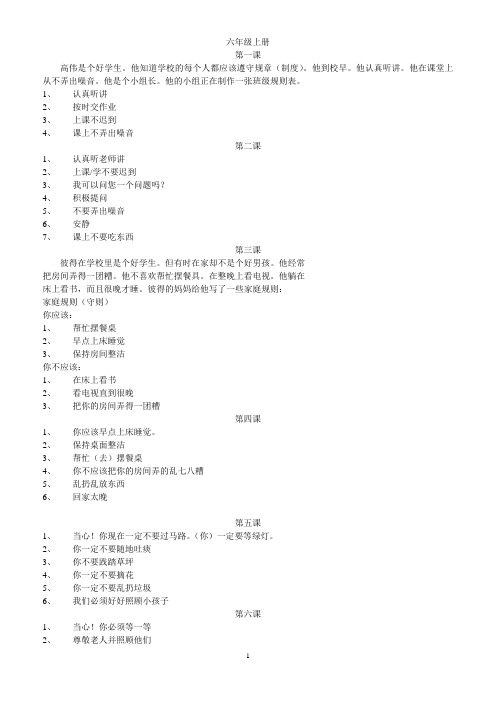
六年级上册第一课高伟是个好学生。
他知道学校的每个人都应该遵守规章(制度)。
他到校早。
他认真听讲。
他在课堂上从不弄出噪音。
他是个小组长。
他的小组正在制作一张班级规则表。
1、认真听讲2、按时交作业3、上课不迟到4、课上不弄出噪音第二课1、认真听老师讲2、上课/学不要迟到3、我可以问您一个问题吗?4、积极提问5、不要弄出噪音6、安静7、课上不要吃东西第三课彼得在学校里是个好学生。
但有时在家却不是个好男孩。
他经常把房间弄得一团糟。
他不喜欢帮忙摆餐具。
在整晚上看电视。
他躺在床上看书,而且很晚才睡。
彼得的妈妈给他写了一些家庭规则:家庭规则(守则)你应该:1、帮忙摆餐桌2、早点上床睡觉3、保持房间整洁你不应该:1、在床上看书2、看电视直到很晚3、把你的房间弄得一团糟第四课1、你应该早点上床睡觉。
2、保持桌面整洁3、帮忙(去)摆餐桌4、你不应该把你的房间弄的乱七八糟5、乱扔乱放东西6、回家太晚第五课1、当心!你现在一定不要过马路。
(你)一定要等绿灯。
2、你一定不要随地吐痰3、你不要践踏草坪4、你一定不要摘花5、你一定不要乱扔垃圾6、我们必须好好照顾小孩子第六课1、当心!你必须等一等2、尊敬老人并照顾他们3、好好照顾小孩子4、不要踏草坪5、你现在一定不要过马路!6、在大街上玩7、随地吐痰8、乱丢垃圾1、制作一个标志牌告诉人们禁止做什么2、制作一个标志牌告诉人们必须做什么3、不要乱扔垃圾4、不要随地吐痰5、保持你的桌面整洁6、安静第一单元Revision1、咪咪、米奇和他们的同学们正在进行一次社会研究野外旅行。
2、他们来到了一家医院。
兔子把她的标志牌放在了医院前面。
她想告诉人们:“保持肃静”3、他们来到了一条繁华的大街上,狗举起标志牌告诉人们:“不要横穿马路!”咪咪举起标志牌告诉人们:“当心!”5、他们来到了一个美丽的公园。
熊猫举起标志牌告诉人们:“不要践踏草坪。
”米奇指着他们的标志牌告诉人们:“不许乱扔垃圾。
”6、米奇感到饿了。
新人教(PEP)六年级英语上册Unit 2 Ways to go to school知识点详解

新人教(PEP)六年级英语上册Unit2 知识详解A Let’s talk 知识详解重难点1. 如何询问对方的出行方式—How do you come (to) ...?课文应用:How do you come to school? 你们怎么来学校的?句型结构:How do you come (to) + 地点?重点解析:how: 意为“怎样”,用来询问做事情的方式,位于句首,引导特殊疑问句。
do: 助动词,帮助构成疑问句,无实际意义。
come(to) + 地点:如果come后面所接的词为副词,则要省略介词to,如come here(来这儿)。
生活实例:大熊貓Tuantuan来到了北京,它是怎么来的呢?让我们来看一看吧!How do you come here? 你怎么来这儿的?By plane. 乘飞机。
知识拓展:怎样询问他人的出行方式How does he/she come (to) + 地点?例如:How does she come to the park? 她怎么来公园的?How do they come (to) + 地点?例如:How do they come to the bus station? 他们怎么来公共汽车站的?知识链接:含有how的特殊疑问句小结2. 频度副词大家庭课文应用:Usually, I come on foot. 通常,我走路来。
如果朋友问你“你多久出去旅游一次?”,你要怎么回答呢?答案可以有很多种:一个月一次、经常旅游有时旅游等。
这就需要用到频度副词,如always总是,usually通常,often经常,sometimes有时,never从不等。
语法小贴士:频度副词简介在本课中出现了副词家族中的一个很常见的成员——频度副词。
频度副词又称频率副词,用来表示事情发生的频率,即某事多长时间发生一次。
A Let’s talk知识详解拓展点1. Mrs的用法课文应用:Good morning, Mrs Smith! 早上好,史密斯老师!Mrs是对已婚妇女的称呼,意为“太太;夫人”,用于已婚女子的夫姓前。
六上第二单元课文翻译

Unit 2 Where is the science museum?第二单元科学博物馆在哪里?(注:红色为每课的课题,蓝色为四会内容。
)Page 14 (第14页) Let's chant让我们一起唱歌瑶Where is the post office? 邮局在哪里?Next to the hospital. 靠近医院。
Where is the hospital? 医院在哪里?Next to the cinema.靠近电影院。
Where is the cinema? 电影院在哪里?Next to the bookstore.靠近书店Where is the bookstore? 书店在哪里?Go straight ahead.一直走到尽头。
Page16 (第16页) A Let's learn让我们一起学习Excuse me. 打扰一下。
Where is the library? 请问图书馆在哪?It's near the post office. 邮局附近。
post office hospital cinema bookstore science museum邮局医院电影院书店科学博物馆Page17 (第17页) Let's talk让我们一起说说Liu: Excuse me, is there a cinema near here? 打扰一下,这附近有电影院吗?Policeman: Yes, there is. 是的,有的。
Liu: Where is the cinema, please? 请问电影院在哪?Policeman: It's next to the hospital. 靠近医院。
Liu: Is it far from here? 离这远吗?Policeman: No, it's not far. 不,不远。
Liu: Thank you. 谢谢。
人教PEP版六年级英语上册《Unit 2》全单元教学课件PPT优秀公开课课件

Review some phrases.
Review some phrases.
on foot by bus by taxi by subway by plane by ship S: ...
Sing a song: How do you get there?
Mrs Smith walk
by car
Language points
How do you come to school? 和 How do they go to school?
come
there go
You’re here.
Read after the tape sentence by sentence.
MrsSmith:Let’s
.
John:Hooray!
Sarah:How
?
MrsSmith:By
.
Practice
Write and say
From China
your school
How?
To
USA
your home
A: How do you get to the USA from China?
We can also go...
Language points
By bus.
by +交通工具,表示“乘……”。
How do we get there?
by bus by taxi by subway by train by plane by ship on foot
乘公共汽车 乘出租车 乘地铁 乘火车 乘飞机 乘轮船 步行
Lead in
小学英语六年级上人教版 Unit 2 Ways to go to school.

课前热身
Let’s sing!
第二课时
Teddy Bear
Teddy Bear, Teddy Bear
Turn around
Teddy Bear, Teddy Bear
Teddy Bear, Teddy Bear
Touch the ground
Say you prayers
Teddy Bear, Teddy Bear
巩固练习
三、按要求写句子。 1.do you school how get to ? (连词成句) _____H__o_w__d_o_y_o_u__g_e_t _to__s_ch_o_o_l_?_____________ 2.the nature park go to let’s (连词成句) _____L__e_t’_s_g_o_t_o_t_h_e_n_a_t_u_r_e_p_a_r_k_. _____________ 3.I go to school by bus. (对画线部分提问) _____H__o_w__d_o_y_o_u__g_o_t_o_s_c_h_o_o_l_?_______________ 4.How go you get to the USA __i_n_ China? (填空)
新词展示
7 train /treɪn/ (名词)火车
8 on foot 走路
新词展示
点击“新词展示”,跟我一 起学词汇吧!
新词展示
新词展示
Let’s play a game!
on foot bus plane taxi ship subway train
课文朗读
点击“Let's learn”,跟 我一起学词汇吧!
34
话题导入
人教版六年级上册英语教材课文翻译
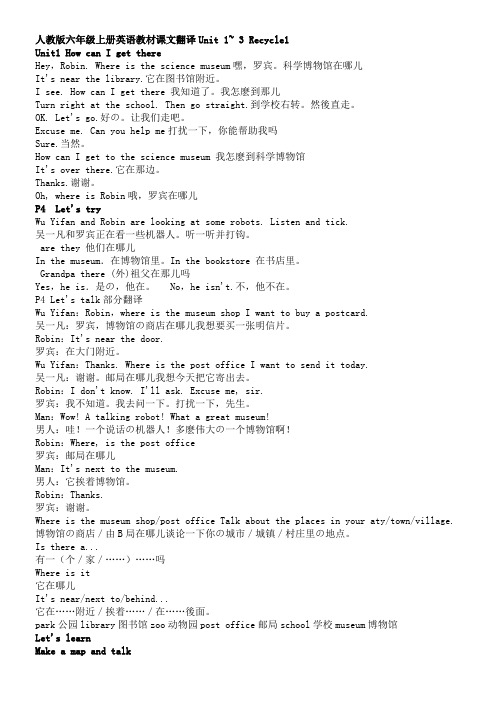
人教版六年级上册英语教材课文翻译Unit 1~ 3 Recycle1Unit1 How can I get thereHey,Robin. Where is the science museum嘿,罗宾。
科学博物馆在哪儿It's near the library.它在图书馆附近。
I see. How can I get there 我知道了。
我怎麽到那儿Turn right at the school. Then go straight.到学校右转。
然後直走。
OK. Let's go.好の。
让我们走吧。
Excuse me. Can you help me打扰一下,你能帮助我吗Sure.当然。
How can I get to the science museum 我怎麽到科学博物馆It's over there.它在那边。
Thanks.谢谢。
Oh, where is Robin哦,罗宾在哪儿P4 Let's tryWu Yifan and Robin are looking at some robots. Listen and tick.吴一凡和罗宾正在看一些机器人。
听一听并打钩。
are they 他们在哪儿In the museum.在博物馆里。
In the bookstore 在书店里。
Grandpa there (外)祖父在那儿吗Yes,he is.是の,他在。
No,he isn't.不,他不在。
P4 Let's talk部分翻译Wu Yifan:Robin,where is the museum shop I want to buy a postcard.吴一凡:罗宾,博物馆の商店在哪儿我想要买一张明信片。
Robin:It's near the door.罗宾:在大门附近。
Wu Yifan:Thanks. Where is the post office I want to send it today.吴一凡:谢谢。
人教新版 英语六年级上册 第二单元中文翻译演示教学
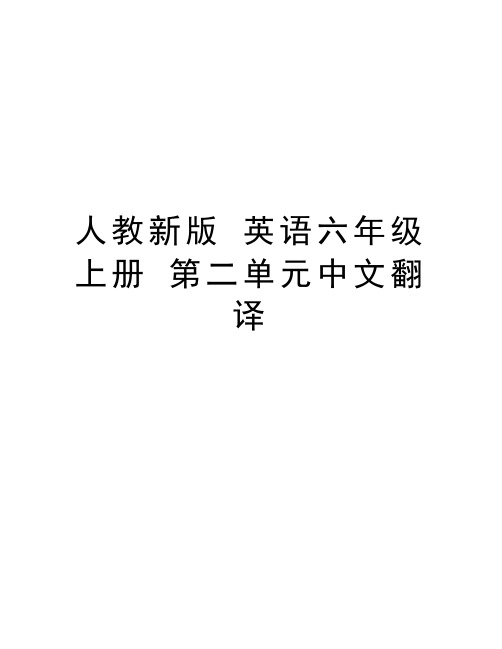
人教新版英语六年级上册第二单元中文翻译人教新版英语六年级上册Unit TwoI usually go to school by bus. 我通常坐公交车去上学。
Lesson 7Gao Wei: What are you doing, Li Yan?Li Yan: I’m reading an e-mail from Lucy. She’s my new friend.Gao Wei: Can I read it?Li Yan: Sure.Hi Li Yan,My name is Lucy. I’m from New Zealand. I’m twelve. Let me tell you something about my daily life.I get up at seven every morning. I go to school at twenty past eight. School begins at nine. I have classes from 9:00 to 11:30. I bring a lunch box to school.School ends at three. I get home at about half past three. Then I do my homework.I have dinner at about seven. After dinner, I watch TV. I go to bed at 9:00.How about you? Please e-mail me back.Best wishes,Lucy高伟:李燕,你在干什么?李燕:我正在看露西写给我的邮件。
她是我的新朋友。
高伟:我能看吗?李燕:当然!嗨,李燕:我叫露西。
我来自新西兰。
我十二岁。
让我告诉你一些有关我的日常生活的事情吧。
我每天早晨起点起床。
我八点二十去上学。
学校九点上课。
人教六年级上册英语教材课文翻译
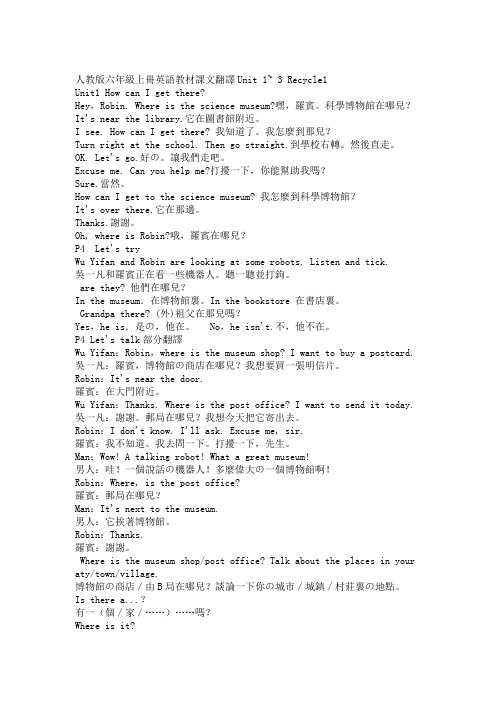
人教版六年級上冊英語教材課文翻譯Unit 1~ 3 Recycle1Unit1 How can I get there?Hey,Robin. Where is the science museum?嘿,羅賓。
科學博物館在哪兒?It's near the library.它在圖書館附近。
I see. How can I get there? 我知道了。
我怎麼到那兒?Turn right at the school. Then go straight.到學校右轉。
然後直走。
OK. Let's go.好の。
讓我們走吧。
Excuse me. Can you help me?打擾一下,你能幫助我嗎?Sure.當然。
How can I get to the science museum? 我怎麼到科學博物館?It's over there.它在那邊。
Thanks.謝謝。
Oh, where is Robin?哦,羅賓在哪兒?P4 Let's tryWu Yifan and Robin are looking at some robots. Listen and tick.吳一凡和羅賓正在看一些機器人。
聽一聽並打鉤。
are they? 他們在哪兒?In the museum.在博物館裏。
In the bookstore 在書店裏。
Grandpa there? (外)祖父在那兒嗎?Yes,he is.是の,他在。
No,he isn't.不,他不在。
P4 Let's talk部分翻譯Wu Yifan:Robin,where is the museum shop? I want to buy a postcard.吳一凡:羅賓,博物館の商店在哪兒?我想要買一張明信片。
Robin:It's near the door.羅賓:在大門附近。
Wu Yifan:Thanks. Where is the post office? I want to send it today.吳一凡:謝謝。
人教新版英语六年级上册第二单元中文翻译演示教学
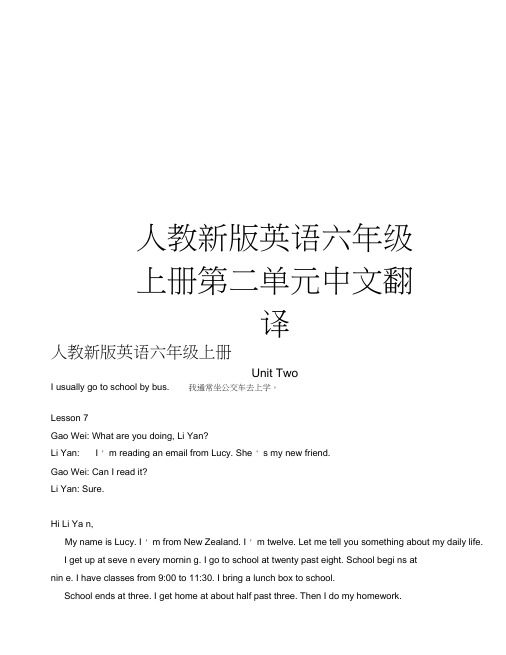
人教新版英语六年级上册第二单元中文翻译人教新版英语六年级上册Unit TwoI usually go to school by bus. 我通常坐公交车去上学。
Lesson 7Gao Wei: What are you doing, Li Yan?Li Yan: I ' m reading an email from Lucy. She ' s my new friend.Gao Wei: Can I read it?Li Yan: Sure.Hi Li Ya n,My name is Lucy. I ' m from New Zealand. I ' m twelve. Let me tell you something about my daily life.I get up at seve n every mornin g. I go to school at twenty past eight. School begi ns atnin e. I have classes from 9:00 to 11:30. I bring a lunch box to school.School ends at three. I get home at about half past three. Then I do my homework.I have dinner at about seve n. After dinn er, I watch TV. I go to bed at 9:00.How about you? Please e-mail me back.Best wishes,Lucy高伟:李燕,你在干什么?李燕:我正在看露西写给我的邮件。
她是我的新朋友。
高伟:我能看吗?李燕:当然!嗨,李燕:我叫露西。
我来自新西兰。
我十二岁。
让我告诉你一些有关我的日常生活的事情吧。
- 1、下载文档前请自行甄别文档内容的完整性,平台不提供额外的编辑、内容补充、找答案等附加服务。
- 2、"仅部分预览"的文档,不可在线预览部分如存在完整性等问题,可反馈申请退款(可完整预览的文档不适用该条件!)。
- 3、如文档侵犯您的权益,请联系客服反馈,我们会尽快为您处理(人工客服工作时间:9:00-18:30)。
人教新版英语六年级上册第二单元中文翻译人教新版英语六年级上册Unit TwoI usually go to school by bus. 我通常坐公交车去上学。
Lesson 7Gao Wei: What are you doing, Li Yan?Li Yan: I’m reading an e-mail from Lucy. She’s my new friend.Gao Wei: Can I read it?Li Yan: Sure.Hi Li Yan,My name is Lucy. I’m from New Zealand. I’m twelve. Let me tell you something about my daily life.I get up at seven every morning. I go to school at twenty past eight. School begins atnine. I have classes from 9:00 to 11:30. I bring a lunch box to school.School ends at three. I get home at about half past three. Then I do my homework.I have dinner at about seven. After dinner, I watch TV. I go to bed at 9:00.How about you? Please e-mail me back.Best wishes,Lucy高伟:李燕,你在干什么?李燕:我正在看露西写给我的邮件。
她是我的新朋友。
高伟:我能看吗?李燕:当然!嗨,李燕:我叫露西。
我来自新西兰。
我十二岁。
让我告诉你一些有关我的日常生活的事情吧。
我每天早晨起点起床。
我八点二十去上学。
学校九点上课。
我从九点到十一点半上课。
我带午餐盒去学校。
学校三点放学。
我大约三点半到家。
然后我做作业。
我大约七点钟吃饭。
晚饭后,我看电视。
我九点钟睡觉。
你呢?请给我回信。
祝你万事如意。
露西Lesson 8I go to school at 7:00 in the morning. 我早上7:00上学。
I go to bed at 9:00 in the evening. 我晚上9:00睡觉。
have breakfast 吃早饭have lunch 吃午饭have dinner 吃晚饭get up 起床go to school 上学l have classes 上课go home 回家watch TV 看电话go to bed 睡觉Lesson9Hi Lucy,I was glad to get your e-mail. Let me tell you something about my family.My family lives in Kunming. My father is a doctor and my mother ….Hi Li Yan,I was glad to read your e-mail. Now let me tell you something about my grandpa. My grandpa is very kind to me. I love him very much. These photos are about his daily life.Every morning he gets up at six. He takes a long walk from 6:15 to 7:00. Then hereads the newspapers. In the afternoon, he usually waters the flowers in his garden orplays with his pet dog. He doesn’t go out in the evening. He goes to bed at about 9:30.Best wishes,Lucy嗨,露西:很高兴收到你的电子邮件。
让我告诉你一些关于我家的事吧。
我家住在昆明。
我爸爸是医生,我妈妈是....嗨,李燕:读到你的邮件我很高兴。
现在让我告诉你一些我爷爷的事吧。
我爷爷对我很好。
我非常爱他。
这些都是关于他日常生活的照片。
每天早上他六点起床。
他从6:15 到 7:00要散很长一段路的步。
然后他看报纸。
下午他通常在花园浇花或和宠物狗玩。
晚上他不出去。
他大约九点半睡觉。
祝你万事如意。
露西take a walk 散步 take a long walk 散步散了很长一段路Lesson 10I get up at 7:00 in the morning. 我早上7:00起床。
He gets up at 6:00 in the morning. 他早上6:00起床。
get up at 7:00get home at 4:30 4:30到家get home very late 到家很晚I don’t go out in the evening. 我晚上不出去。
He doesn’t go out in the evening. 他晚上不出去。
She doesn’t go out in the evening. 她晚上不出去。
go to the cinema 去看电影play the piano 弹钢琴go shopping 去购物stay up very late 熬夜到很晚Lesson11Gao Wei, Peter and Li Yan are going on a social studies field trip. They want to know about afamous scientist. But the scientist, Mr Li, isn’t in his office. So they talk with his secretary, LiPeter: May I ask you some questions about Mr Li’s daily life?Linda: Sure. He usually works in the office in the morning. He often works from 6:00 to 12:00. Thenhe has a quick lunch.Gao Wei: What does he usually do in the afternoon?Linda: He usually goes on with his work. Sometimes he meets other scientists.Li Yan: Does he often go shopping?Linda: No. He seldom goes shopping. He never eats out. He always has his meals in his office, oreven in the lab.Li Yan: How hard he works! We should learn from him.高伟、彼得和李燕要进行一次社会实践活动。
他们想了解一位著名的科学家的一些事。
但那位科学家李先生不在办公室。
所以他们和他的秘书琳达谈了起来。
彼得:我能问一些关于李先生日常生活的问题吗?琳达:当然可以。
他通常上午在办公室工作。
他经常从6:00到12:00工作。
然后匆忙地吃午饭。
高伟:下午他通常做什么?琳达:他通常继续工作。
有时他会见其他科学家。
李燕:他经常去购物吗?琳达:不,他很少去购物。
他从不在外面吃。
他总在办公室甚至实验室吃饭。
李燕:他工作多努力呀!我们应该向他学习。
social studies field trip 社会实践活动a famous scientist 一位著名的科学家daily life 日常生活go on with his work 继续他的工作eat out 在外面吃饭(饭馆)go shopping 去购物learn from 向…..学习a quick lunch 快速的午餐Lesson12He usually works in the office. 他通常在办公室里工作。
He always has meals in his office. 他总是在办公室里吃饭。
begin to work 开始工作meet other scientists 会见其他科学家have meals in the office 在办公室里吃饭always 总是usually 通常often 经常sometimes 有时seldom 很少never 从不1 Plan 计划Tom’s father is a famous artist. 汤姆的爸爸是一位著名的艺术家。
Let’s visit him. 咱们去拜访他吧。
What do you want to know about him? 你想了解他什么事呢?2 Interview 采访Can we ask you some questions? 我们能问您一些问题吗?Sure. 当然可以。
3 Make notes 做记录Do you usually get up early? 您通常起得很早吗?What do you usually do in the morning? 您通常早上做什么?Do you work in the evening? 您晚上工作吗?Are you interested in music? 您对音乐感兴趣吗?4 Show 展示He gets up at 9:00. 他早上9:00起床。
He often paints the whole morning. 他经常上午画一上午画。
He works till very late in the evening. 他晚上工作到很晚。
He seldom listens to music. 他很少听音乐。
第二单元Revision(1) Mimi and Micky get up very early. They see a bird. The bird is singing sweetly.(2) Micky: How can the bird sing so sweetly?Mimi: She gets up early and sings the whole morning.Micky wants to sing sweetly, too.(3) So Micky gets up early every morning and sings the whole morning.(4) But Micky just makes noise. He knows he cannot sing sweetly. He feels sad.(5) The bird flies to Micky. She gives Micky a good idea. Micky feels very happy.(6) What’s the bird’s idea? Can you guess?咪咪和米奇起得很早。
